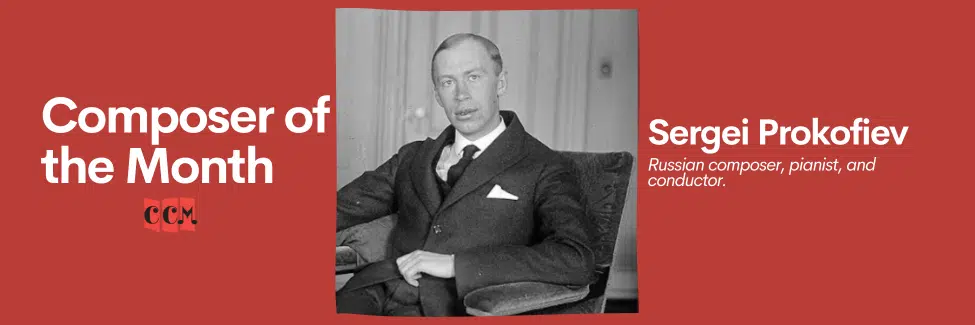April 1, 2024
Sergei Prokofiev: April Composer of the Month

In classical music’s history, Sergei Prokofiev stands out as a captivating composer. His works enchant and move us all deeply. As CCM’s April’s Composer of the Month, we explore his life and impactful music. From Tsarist Russia to global fame, Prokofiev’s journey shows his adaptability and genius.
Early Life and Inspirations
Prokofiev was born in 1891 in the Russian Empire. He was a a musical prodigy and composed his first piano piece at just five years old. His mother, a pianist, was his first mentor, fostering his burgeoning talent in the rural serenity of Sontsovka. By the age of thirteen, Prokofiev’s exceptional abilities secured him a place at the St. Petersburg Conservatory. At the conservatory, he studied under giants like Nikolai Rimsky-Korsakov. His education exposed him to a breadth of musical styles and techniques. He swiftly absorbed this knowledge while nurturing a distinctive voice that often challenged conventional norms. His early works are characterized by their innovative harmonic language and rhythmic vitality. Ultimately, it was apparent at the early stages how he would go on to become a groundbreaking name in music history.
Sergei Prokofiev’s Music Career
Prokofiev’s career was a rollercoaster ride that mirrored the tumultuous socio-political landscape of the 20th century. After making a name for himself in Russia, he sought new horizons in the United States and Europe. While he traveled, he achieved significant acclaim but also faced periods of hardship and obscurity. His return to the Soviet Union in the 1930s marked a complex phase of his career. He then had to navigate the demands of the state while striving to maintain artistic integrity. Despite these challenges, Prokofiev’s output remained prolific and diverse, encompassing operas, ballets, symphonies, concertos, and film music. His adaptability and unwavering creative vision showcase his resilience and artistic ingenuity.
Unique Aspects of Prokofiev’s Music
Prokofiev’s music is distinguished by its blend of lyrical melodicies and dissonant harmonies. This reflected his desire to innovate within the classical tradition. He had a penchant for fairy tales and folklore, which inspired some of his most enchanting compositions. Additionally, his music often possesses a biting wit and satirical edge, revealing a keen insight into human nature and society. Prokofiev’s approach to composition was both cerebral and emotional, allowing him to craft works that engage the listener on multiple levels. His skill in orchestration is particularly noteworthy and enabled him to achieve a wide range of colors and textures that bring his musical narratives to life.
Notable Works and Themes
Among Prokofiev’s vast repertoire, several works stand out for their enduring popularity and significance. “Peter and the Wolf,” a symphonic fairy tale for children, remains one of his most beloved compositions, introducing countless young listeners to the instruments of the orchestra. His ballets “Romeo and Juliet” and “Cinderella” are celebrated for their melodic beauty and dramatic depth, reimagining classic stories with fresh musical insight. The “War Sonatas” for piano are another highlight, reflecting the turbulence of World War II with profound emotional resonance. These works, along with his symphonies and concertos, showcase Prokofiev’s versatility and his ability to infuse traditional forms with a modern sensibility.
Check out this performance of “Peter and the Wolf” by Vancouver Symphony Orchestra.
Final Thoughts
Overall, Sergei Prokofiev’s legacy is that of a musical visionary who continually pushed the boundaries of composition. His works, characterized by their emotional depth, technical brilliance, and innovative spirit, have secured his place among the great composers of the 20th century. As we celebrate him as our Composer of the Month, we are reminded of the enduring power of music to reflect and transcend its time. Prokofiev’s journey from the conservatory in St. Petersburg to the concert halls of the world is a testament to his relentless pursuit of artistic expression. His music continues to inspire and challenge us, inviting listeners and performers alike to explore the boundless possibilities of the musical art form.
Sign up for a FREE introductory lesson at The California Conservatory of Music!

